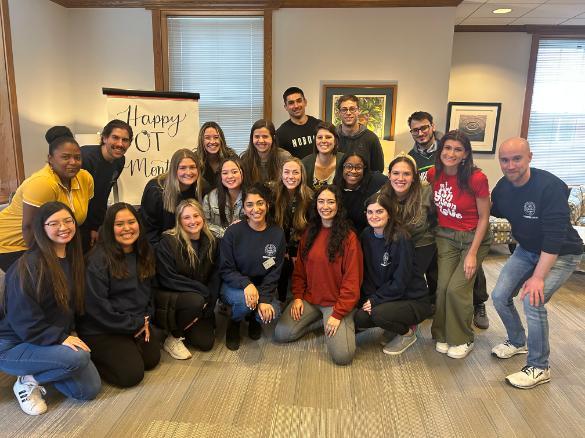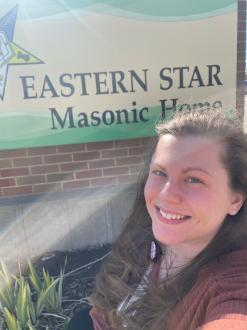Meet Tiya Tito.
Tiya Tito is a 2023 graduate of Drake University's Occupational Therapy Doctorate program. In the final year of the program (O3), Tiya completed her Doctoral Capstone Experience with Elmhurst University's Master of Occupational Therapy program.
Name: Tiya Tito
Hometown: Glenview, Illinois
Degree Program: OTD, May 2023
Doctoral Capstone placement: Elmhurst University's Master of Occupational Therapy program
Tell us about your Doctoral Capstone. What were your responsibilities and what did a typical day look like?
My Occupational Therapy Doctoral Capstone has been such an amazing experience and an absolute blessing and gift that God gave me! With the support and guidance of my advisor, Dr. Urish, I was pushed out of my comfort zone to go into academia and teach the Masters of Occupational Therapy (MOT) students at Elmhurst University. Taking this capstone was extremely life-changing and I want to become a professor as an occupational therapist in the near future.
I completed three teaching lecture/lab classes during the semester. I taught a mental health course to the MOT students called Evaluation I. One of the main lab/lectures of the class I prepared for and delivered was on the topic of understanding and applying trauma-informed care in the populations of domestic violence and sexual violence. This was a three-hour class where I educated the students about trauma, trauma-informed care, domestic violence, sexual violence, and how this topic connects to occupational therapy. I was also comfortable enough to share my own story in the class. The class consisted of lectures, open discussions, and a case study about domestic violence and sexual violence that aligned with the Netflix series, Maid. It was such an honor, privilege, and blessing to teach this topic to the MOT students because of how domestic violence and sexual violence are not common topics in occupational therapy.
I also delivered two lunch and learn sessions to the MOT students. The first lunch and learn was on the topic of intersectionality, implicit bias, explicit bias, microaggressions, cultural sensitivity, and cultural humility. The second lunch and learn was called Dance to Feel, Dance to Heal. The topics discussed were what is dance, what is healing, how to heal through traumas, generational traumas, and how dance heals through forms of traumas. Lastly, we ended the discussion with an Indian dance I taught my students.
I also assisted in the MOT students' Evaluation 2 Physical Disabilities lab class. During the labs, students practiced administering assessments such as the Bruininks-Oseretsky Test of Motor Proficiency (BOT-2), Peabody Developmental Motor Scales (PDMS-2), Sensory Processing Measure (SPM), Sensory Profile 2, Motor-Free Visual Perception (MVPT-4), Beery VMI, Semmes Weinstein monofilament test, and neurocognition assessments.
Another amazing part of my capstone was working with my students’ research group on the impact of dance and music on clients with memory loss. I also attended the MOT students' fieldwork 1 sites - Gigi’s Closet and Easter Seals. I assisted the students with their responsibility to create interventions at these sites.
What was your favorite thing about the Doctoral Capstone Experience at Elmhurst University?
It is really amazing to reflect back on how much of my passions and interests came in my capstone at Elmhurst University. It is hard to pick one thing because every single moment has been an amazing experience but I would say that educating future occupational therapists in trauma-informed care in populations of domestic violence and sexual violence, delivering the lunch and learn sessions on cultural sensitivity and cultural humility, and leading and assisting the mental health and physical disabilities labs were my favorite parts. I know that each student will make an incredible impact in the profession of occupational therapy and on their clients' lives. The students and the faculty were also great to interact, work with, and educate.
I loved teaching the students about topics that are not widely discussed such as intersectionality, explicit biases, implicit biases, microaggressions, cultural sensitivity, cultural humility, and how dance heals trauma. Teaching my lab/lecture on the topic of understanding and applying trauma-informed care in the populations of domestic violence and sexual violence in my capstone was a highlight of the experience for me because society needs more knowledge and awareness of these topics, as well as healthcare and non-healthcare professions. It brought me a lot of joy and gratefulness that I was able to bring my passion for being an advocate for domestic violence and sexual violence into the occupational therapy profession. I never knew I would tell my story and realize how much I turned my pain into power by educating occupational therapy students and faculty on these topics. My entire doctoral capstone experience will stay with me forever throughout my life and occupational therapy career.
I have also loved receiving so much wisdom and knowledge from my capstone site mentor/professor and the professors and students at Elmhurst! Meeting with my capstone site mentor every week to discuss my progress and receive her advice and the foundations of academia and occupational therapy was an impactful experience.
What attracted you to Drake's OTD program?
What attracted me to Drake’s OTD program was the opportunities, support, resources, professors, capstone experience, and what Drake University as a whole offered me. The professors are always finding ways and reaching out to students to provide us with the best possible educational experience we can receive.
With starting the OTD program during COVID, it was challenging for all the students to adjust to online classes and a lot of opportunities being virtual. However, after COVID, my experience did get better because of the experiences and the learning opportunities we were given in person. Being an OTD class representative and being on the CPHS diversity, equity, and inclusion committee, it was awesome and empowering that the program offered positions to students that felt that there is so much to improve on in different ways to implement diversity, equity, inclusion, and more discussions about race, cultural sensitivity, cultural humility, and how it connects to occupational therapy and health care professionals as a whole.
How has Drake helped you prepare for your future career as an occupational therapy professional?
Drake has helped me prepare for my future career as an occupational therapy professional because of the support I received from my professors and my peers along with the resources and opportunities provided. My peers were always supportive and we helped each other reach success in the occupational therapy program. With the support from my professors, I had access to a lot of resources through networking with other occupational therapists, healthcare professionals, and non-healthcare professionals. My professors made sure to give us the best educational experience during the COVID semesters and after as we transitioned back to in-person learning.
My advisor, Dr. Urish, is a huge part of my occupational therapy journey because she was always uplifting, supportive, and had faith in me when times I did not have faith in myself. She provided many resources for occupational therapy with dance, mental health, and other resources that resonated with my passions in the profession. She also attended and supported my webinars about the prevention and awareness of sexual violence and about the power of dance. She reminded me to always stay true to myself and never give up! Talking to her always made my bad days turn into good days.
What are your career goals? Have they changed at all since you started Drake's OTD program?
My career goals are to become an occupational therapist focusing on pediatrics, specifically with special needs children and individuals with neurodevelopmental disorders. I also want to work with individuals with neurogenerative disorders such as Parkinson’s disease, Alzheimer’s disease, dementia, etc.
I have a strong passion to pursue and work in mental health within occupational therapy. I want to bring more education, awareness, change, and understanding to all patients and everyone as a whole on approaching and working with mental health. I also want to become a professor to educate occupational therapy students and all students on trauma-informed care approaches in the populations of domestic violence and sexual violence, cultural sensitivity, cultural humility, and mental health.
Lastly, I want to work with victims and survivors of sexual violence, domestic violence, and various types of trauma. I want to educate healthcare professionals, non-healthcare professionals, clients, and everyone on the topic of trauma-informed care within the populations of sexual violence and domestic violence. With that, I want to educate others on the impact of cultural sensitivity and cultural humility there is when working with all types of patients and individuals. One day, my dream is to open up a women’s domestic violence shelter in Chicago and/or work in a domestic violence shelter in Chicago to educate victims and survivors about trauma and the coping mechanisms with trauma. In addition, I want to implement the intervention of dance to victims and survivors of sexual violence and domestic violence which is an impactful and powerful type of coping mechanism when dealing with trauma.
What is one piece of advice you'd give to future occupational therapy students?
Turn your pain into power and stay true to yourself! Do not dim your light for ANYONE! People need you to be you! You have God-given Gifts, you are made to express it for yourself and others! I never thought I would bring my passion for dance and advocacy in the prevention and awareness of domestic violence and sexual violence into the occupational therapy profession. God definitely used my story so that I could grow awareness of and educate occupational therapy students, healthcare professionals, and all individuals about domestic and sexual violence. Overall, this is a step in making the discussion of these issues less taboo.
Return to the OTD Capstone Spotlight home page here.


